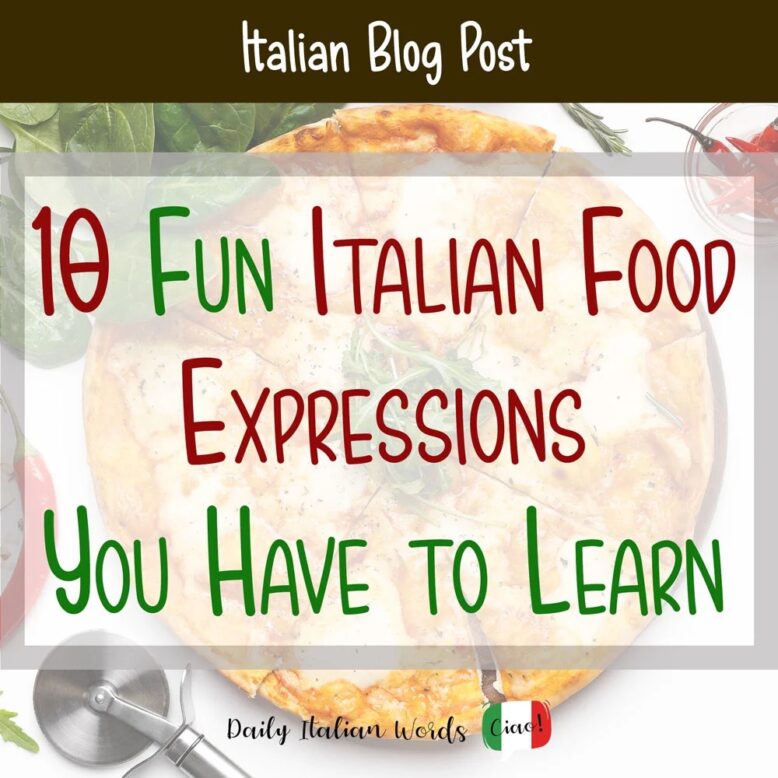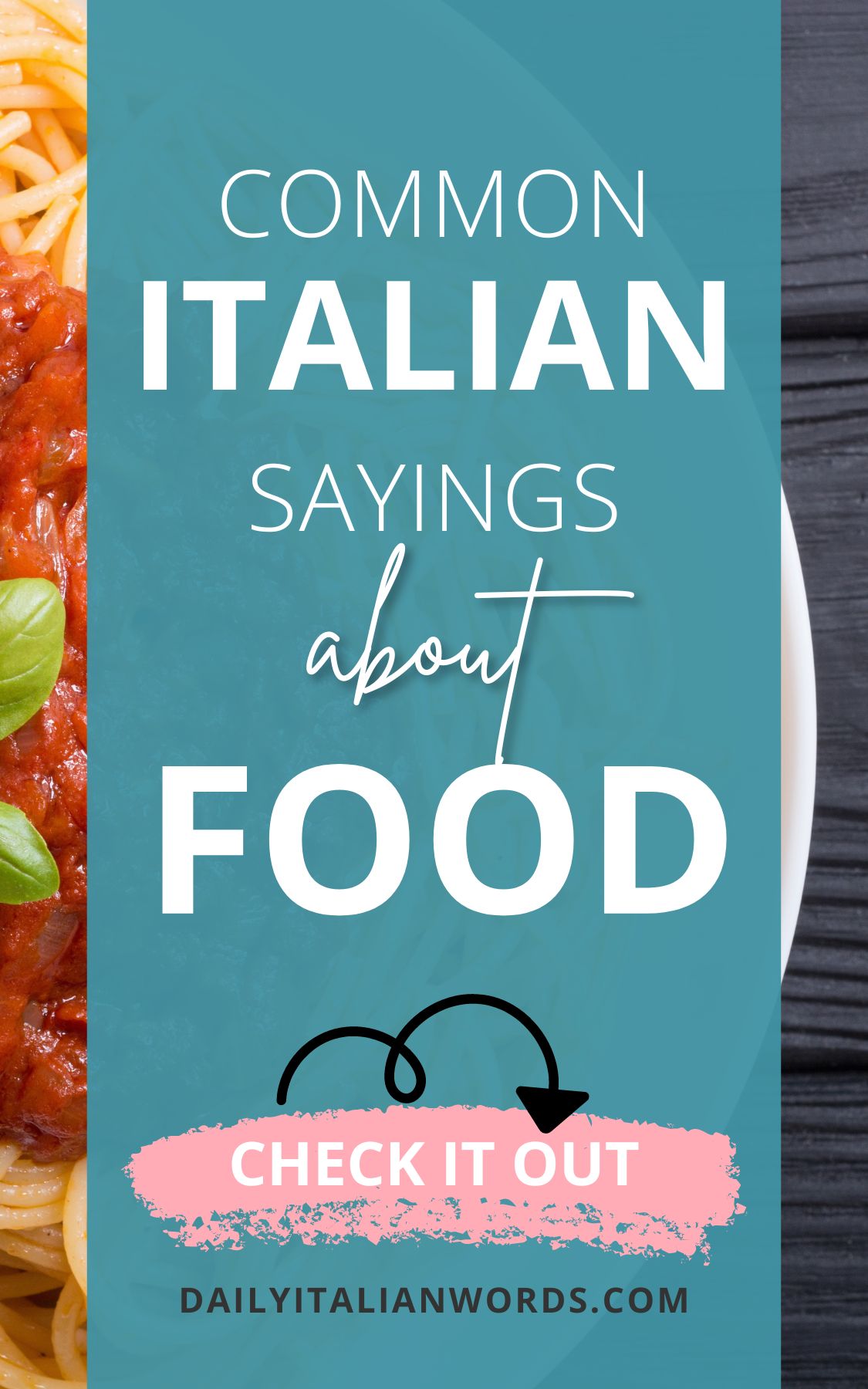Food is an incredibly important part of Italian culture, so it is little wonder that so many of their most popular sayings and idioms contain words related to food and eating!
In this article, I’ve come up with a list of ten of the best Italian sayings featuring food that I’ve encountered since I started learning the language. By using them correctly in conversation, you are guaranteed to impress your Italian friends!

1. Far venire il latte ai gomiti
Food: latte (milk)
Literal translation: To bring milk to the elbows
English meaning: To bore someone to death
Italians often use this saying to describe people, activities or situations that they find incredibly dull, frustrating or annoying, and as expressions go, it’s pretty evocative. Just imagine how boring it would be to watch a drop of milk slowly make its way from someone’s mouth all the way down to their elbow!
Guardare il curling mi fa venire il latte ai gomiti.
Watching curling bores me to death.
An alternative to this saying is far venire il latte alle ginocchia. All it does is replace gomiti (elbows) with ginocchia (knees), meaning it has an even longer distance to travel! 😉
2. Tutto fumo e niente arrosto
Food: arrosto (roast)
Literal translation: All smoke and no roast
English meaning: All talk and no walk; all bark and no bite
You can use this expression to describe someone who appears skilful or accomplished on the surface but actually has very little substance. It is often used when talking about sportsmen who perform lots of tricks but never manage to score a point, or politicians who make promises they cannot keep.
Quel politico è tutto fumo e niente arrosto.
That politician is all talk and no walk.
3. Cadere come una pera
Food: pera (pear)
Literal translation: To fall like a pear
English meaning: To fall hard (in a figurative sense)
When a hanging pear is fully mature, what does it do? It drops to the ground of course! Italians use this saying to describe figurative situations in which someone might fall hard. For example:
- when you suddenly fall asleep
- when you fall into a trap that would have been easy to avoid
- when you fall madly in love
You can choose to add the words matura (mature) or cotta (cooked, burnt) after pera or replace the verb cadere (fall) with cascarci (fall for [sth]).
Giulio è caduto come una pera cotta.
Giulio suddenly fell fast asleep.
Giulio fell madly in love.
Giulio fell into the trap / was conned.
4. Non capire un cavolo
Food: cavolo (cabbage)
Literal translation: To not understand a cabbage
English meaning: To understand nothing / To not understand anything
The Italians love their cabbages, so much in fact that the word appears in multiple idioms. In this particular saying, cavolo functions as a euphemism for the word niente which means nothing/anything in Italian. Other words you can use besides cavolo include tubo (tube), bel niente (beautiful nothing) and mazza (club).
Non capisco un cavolo di quello che dici.
I don’t understand anything you’re saying.
5. Una ciliegia tira l’altra
Food: ciliegia (cherry)
Literal translation: One cherry pulls another
English meaning: To be moreish; to be so good you can’t just have one
This saying refers to the fact that cherries most often come in pairs. When you pull at one cherry, the other comes along with it because their stalks are joined at the nub. Taken as a figurative expression, it means that you simply cannot stop at one cherry because they’re so moreish.
It isn’t uncommon to replace the word ciliegia with other addictive foods such as cioccolatini (chocolates) or patatine (potato chips).
Queste ciliegie sono così buone: una tira l’altra!
These cherries are so good: it’s impossible to eat just one!
6. Prendere uno spaghetto
Food: spaghetto (spaghetti noodle)
Literal translation: To take a spaghetti noodle
English meaning: To be very surprised, scared
This saying probably derives from the mental image of a person who is so scared that they involuntarily make twisting or squirming movements with their body, just like a cooked spaghetti noodle. Another variation that projects a similar image is prendere uno spago (to take a string). Cute, isn’t it?
Mi ha fatto prendere uno spaghetto!
He scared the life out of me!
7. Tutto fa brodo
Food: brodo (broth)
Literal translation: Everything makes broth
English meaning: Every little bit helps
Back in the Middle Ages, people used to eat broth every day because they could easily prepare it by adding whatever leftovers they could get their hands on. Just as every little bit of food helps to make broth, so does every small action or kindness help to make life easier.
Questo mese ho risparmiato €50. Non è molto ma tutto fa brodo.
This month I saved €50. It’s not much but every little bit helps.
8. Capitare a fagiolo
Food: fagiolo (bean)
Literal translation: To happen at the bean
English meaning: Perfect timing; to come at the right time
This saying refers to something that happens exactly at the right moment, whether we expect it or not. It may also refer to a person who has perfect timing. Some other variations on the verb capitare (to happen) are cadere (fall), cascare (fall), andare (go) and venire (come).
The exact origin of this expression remains uncertain but what we do know is that fagioli were an important part of the Italian diet because they were affordable and easy to preserve.
L’offerta di lavoro è capitata a fagiolo.
The job offer came at exactly the right moment.
9. Non tutte le ciambelle escono col buco
Food: ciambella (donut)
Literal translation: Not all donuts come out with the hole
English meaning: Things can’t be expected to turn out right every time
This saying is pretty self explanatory. No matter how good you are at making donuts (or whatever your personal talent may be), you won’t get perfect results every single time. You can use this expression with someone who expected to do well but was unexpectedly let down.
Nonostante tutti gli allenamenti che ha fatto, Marco non è rimasto soddisfatto della sua gara. – Eh, sai, non sempre tutte le ciambelle escono col buco. La prossima volta andrà meglio!
Despite all the training he did, Marco wasn’t satisfied with his race. – Well, you know, you can’t always expect to do well. He’ll do better next time!
10. Vestirsi a cipolla
Food: cipolla (onion)
Literal translation: To dress like an onion
English meaning: To dress in layers
The thing about spring and autumn weather is that you can never tell how cold or warm it is going to be just from looking out the window. On days like this, it is always a good idea to dress in layers or vestirsi a cipolla as the Italians say!
Stamattina ho vestito mio figlio a cipolla. C’era il sole ma anche un vento freddo.
This morning I dressed my son in layers. It was sunny but there was a cold breeze.
Which of these Italian food idioms is your favourite and why? Let us know in the comments below! 🙂

Heather Broster is a graduate with honours in linguistics from the University of Western Ontario. She is an aspiring polyglot, proficient in English and Italian, as well as Japanese, Welsh, and French to varying degrees of fluency. Originally from Toronto, Heather has resided in various countries, notably Italy for a period of six years. Her primary focus lies in the fields of language acquisition, education, and bilingual instruction.


